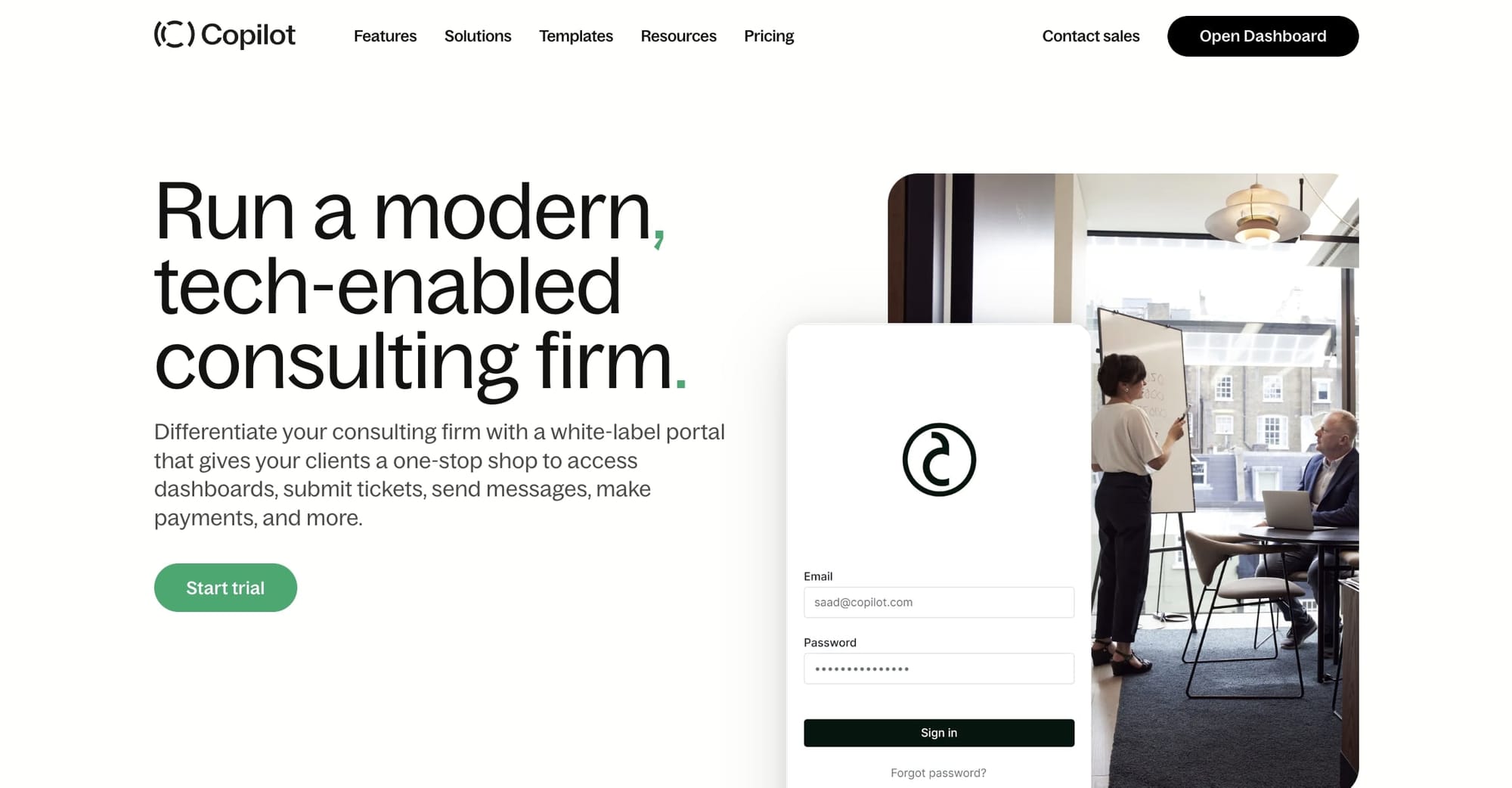Consulting business model: The ultimate guide for 2024
In this article, we'll explore the power of a consulting business model. If you have a knack for solving business problems, this is a fruitful model.

Are you a creative thinker with great interpersonal and communication skills? Do you have a natural flair for solving problems thanks to your first-rate analytics abilities? Can you bring a large amount of industry knowledge and business acumen to the table?
If you answered yes to all three questions, it sounds like you might have what it takes to become a consultant.
However, turning all that potential into a profitable business takes time, graft, and a solid understanding of the consulting business model.
In this article, we’ll share everything you need to know about starting a successful consultancy business in 2024.
Why consultants are essential in our modern economy
Entrepreneurs and business owners are remarkable people. Armed with little more than a dream and a tireless work ethic, they start businesses against the odds and, on occasion, the advice of friends and families.
Some of these ventures fail to catch fire, while others go on to survive the ups and downs and become a success.
However, as anyone who follows the startup space knows, starting a business and growing a business require different qualities and characteristics.
There are many ways for businesses to grow and change. They can adopt new strategies, improve operational efficiency, or introduce technology that saves them time and money or allows them to increase their output. Yet, most businesses lack the specialist internal skills to manage this progress. That is where consultants come in.
Consultants offer businesses a mix of the experience, expertise, and insights they need to pull off ambitious projects, pivot into exciting new areas, or expand their productivity. They’re strategists and problem-solvers with specialist knowledge and a keen awareness of industry trends and change management.
In short, businesses hire consultants to fill skill gaps within their organization so they can achieve their goals.
What are some of the typical tasks that consultants do?
There are an almost endless amount of services that consultants offer across a wide range of industries like marketing, HR, tax, IT, business management, and more. However, despite the diversity of objectives or projects, consultants typically have a few core skills.
- Research and analysis: A big part of consultancy involves research into markets, products, target audiences, and competitors. The job can also involve digging into how a business currently operates and finding ways to remove bottlenecks and make it more efficient.
- Strategy: Consultants also need to develop strategies that are tied to specific business objectives. This process might involve recommended actions, purchases, and resource allocation or drawing up a roadmap for the business.
- Change management: Consultants can also help usher in change, such as a new technology or software system, production techniques, or structural overhauls.
- Problem-solving: Often, businesses employ consultants when they have a particular problem they need to address, such as increasing revenue, driving productivity, or finding ways to save money or become more efficient. Being solution-oriented is a big plus.
- Communication: Finally, consultants need to have the communication and presentation skills required to deliver learning and recommendations to get stakeholder buy-in.
The consulting business model explained
The consulting business model is a framework that describes how consultants:
- Bring value to their clients
- Generate revenue
- Deliver their service
Let’s break down these three areas of the consulting business model before demonstrating how Assembly can help in each scenario.
Bringing value
Most businesses have finite resources. They don’t have cash reserves that they can fritter away on a consultant who can’t make an impact on their business. So, if you want to start a consulting business, the first thing you need to do is figure out how you will deliver value to your clients.
A few of the most popular ways that consultants bring value to businesses include:
- Understanding the types of problems that businesses face and having the skills, expertise, and experience to resolve these issues so that businesses can achieve their desired objectives.
- Lending their deep and specialized knowledge in particular areas, like technology, finance, management, marketing, or operations, to advise businesses on how they can grow or develop.
- It’s easy for business owners to be sentimental or too close to their business to make effective changes. Consultants offer businesses a sense of objectivity that can come in very handy when difficult decisions lie ahead.
Revenue
The next thing you need to know about your consulting business model is how you will generate your revenue. There are a few different ways to charge your clients. Here are a few of the most popular methods.
- Per hour or per day: Many consultants invoice clients with an hour or day rate.
- Project-based: These charges are based on completing a project or reaching a particular objective.
- Retainer: The client pays a recurring monthly fee to have access to a consultant's experience when needed.
- Results-based: Some consultants will charge their clients based on the effect their work has on the business. For example, that could mean a percentage of new revenue or cost savings.
There is no “right” revenue model. It really depends on the service you offer and your client's preferences.
Delivering your service
Next up, we’ll take a look at the different ways that consultants deliver their business. There are four main categories here. Depending on your business, you might offer one, some, or all of these types of consulting.
- Expert: This type of consultant typically comes with a wealth of experience or an extensive background in a particular discipline or topic. For example, that could be something like a tax, legal, or technology consultant. These consultants offer expert advice or guidance in their field of knowledge.
- Trainer: Many consultants offer specialized training to help businesses get up to scratch on various subjects. Again, these consultants bring experience in their niche and leverage that to devise and deliver programs or workshops for staff or management.
- Facilitator: These consultants are typically hired to solve problems within a company. They devise solutions to particular issues and help train and educate staff on best practices for achieving their objectives.
- Coach: Consultants can also work in a more one-on-one capacity to support clients in achieving their goals and objectives.
Different types of consulting business model
There are typically four different types of consulting business models:
- Independent consultants: Independent or solo consultants are the most common and most traditional consulting business model. Typically, these consultants work on one-off projects, initiatives, or objectives.
- Boutique consultancy firms: This kind of consultancy firm is larger than a solo consultant but smaller than a consulting firm. Typically, they provide services within niche specialties.
- Consulting firms: Consulting firms differ from the traditional model in both size, scale, and variety of specialties. These businesses hire lots of different consultants for their various clients.
- Contracted consultant: Contracted consultants work on an ongoing basis with a company. The particularities change from arrangement to arrangement, but payment can be in the form of recurring monthly charges or a contract.
Biggest challenges facing consulting services in 2024
Running a consulting business comes with some difficulties that you’ll have to overcome if you want success. Let’s explore these challenges and share some solutions.
Competition
There is no getting away from it, if you want to be a successful consultant, you’ll need to find a way to stand out from the competition. But how can you outmuscle and outthink bigger firms?
How to outshine your competition
- Drill down into an underserved or emerging niche where you have a lot of knowledge or expertise.
- Use your existing network or any connections you have to land clients.
- Establish and promote your expertise in a space by writing blogs and articles on platforms like LinkedIn.
Assembly helps teams become more efficient by centralizing communications, automation, and integration with popular apps. If your operations are lean, you can outwork bloated rivals with competitive pricing and superb service.
Rising client expectations
Clients are becoming more demanding. They want quicker results, better communication, and lower prices. In short, they don’t want to open their checkbook unless they’re getting value. What’s more, they expect more flexibility, forcing consultants to innovate or get left behind.
How to deal with rising client expectations
- Make sure there’s open and transparent communication with project management tools and client portals.
- Take the time to really understand what your client needs from your service.
- Emphasize the value that your services bring by communicating quantifiable results and outcomes rather than focusing on hourly or daily rates.
Assembly offers users a polished and professional client portal that helps centralize communications and projects. You can add your own branding to the portal and, when augmented with various project management tools, everything is manageable in one place.
Client retention
While lots of consultants work from project to project, the uncertainty and unpredictability can be a real issue. As a result, we’re seeing more consultants move towards a subscription or productized business model.
The thing with subscription business models is that client retention becomes a major priority. Great onboarding experiences have a huge effect on client retention, so ensure it’s something you think about.
How to boost client retention
- First impressions count. So, ensure that client onboarding experiences have minimal friction. Where possible, automate onboarding.
- Use a knowledge base to share pertinent information with your clients.
- Stay on top of client satisfaction by gathering feedback through short surveys.
Assembly can boost your client retention through personalized, client-centric onboarding. When you automate your onboarding and contracts, your clients don’t need to sit around waiting for replies. So, get out there and make a great first impression.
Late payments and cash flow
Cashflow is a well-known small business killer. Late or delayed payments can really eat into your cash flow.
How to deal with late payments and cash flow issues
- Use a subscription or productized business model to make sure you get paid on time.
- Offer a mix of payment processing options for your clients, so they can pay how they prefer.
- Draw up contracts that include a late payment penalty or discounts for early payments.
Dealing with disputes
In an ideal world, every consulting project you take will go without a hitch. Unfortunately, we don’t live in such a magical place, and you’ll run into issues from time to time. However, how you deal with these disputes is what counts.
How to deal with client disputes
- The best way to deal with client disputes is to avoid them altogether. Draw up clear terms of service and stick to them. Better yet, use a productized service model so your clients know exactly what they are getting.
- If your client is unhappy, acknowledge and listen to their concerns, and focus on resolving the issue. If all else fails, consider mediation to resolve the issue.
- Make sure that you document everything, including agreements, discussions, client expectations, and all communication. You never know when you'll need it.
Again, Assembly has a range of features that ensure safe and legally sound working relationships. For starters, you can use Assembly to build contracts that clearly outline what clients can expect from your service. If you’re not sure what to include in your consulting contract, here is a useful template.
From there, you can conduct all your communication and document sharing via the client portal, meaning any back-and-forth is recorded and easy to access.
Technological disruption
Things have changed dramatically in the consulting space in the last decade. Technology has been the key driver of many of these changes, with things like cloud computing, automation, and AI having a massive impact.
Businesses that have embraced technology have improved client experience and expanded their service offerings. Those who were stuck in the old ways have become obsolete.
A good consultant is always learning and developing. Trends move in and out of fashion, and consultants need to be ready to advise their clients how to use them to improve their business and leverage them within their own practice, too.
How to deal with technological disruption
- Embrace innovative technologies for both you and your clients. A good consultant should be able to see through the fog of hype and understand which tools can actually make a big impact.
- Stay on top of cutting-edge technology as part of a continuous learning and development mindset.
- Understand how automation and AI can improve your own business processes and free up your time to focus on core duties.
Assembly helps users unlock the many benefits of automation for onboarding, marketing, scheduling meetings, communication, file-sharing, and more. Check out this comprehensive list of automations that are possible with Assembly.
Tips for embracing the consulting business model
While it might be a competitive space, now is a great time to start a consulting business for one great reason: businesses need specialized and expert advice to thrive!
Here are some tips for making your consulting business model work.
Do what you’re great at
For some consultants, picking a lane was never an issue. They had the contacts, experience, and qualifications to gain a foothold in their niche, and they just went with it. So, if you have a track record or sterling reputation in a particular industry, it makes sense to follow that path.
However, not everyone has the sort of background that lets them seamlessly move into consulting. But that doesn’t mean you can’t be successful. As long as you have passion for your niche, and an aptitude for problem-solving, networking, and delivering results, you can make it in this profession.
Build a strong brand
Great brands are a mix of the right visuals, tone of voice, and values. While the results you drive for your clients are what ultimately defines your reputation, businesses choose consultants based on fine margins. So, consider who your ideal customer is and shape your brand and consulting website around the qualities they want. If you need some ideas for your consulting business name, read this article.
Consider offering productized services
Winning and onboarding new clients can be a bit of a time-sink. The worst part is that trashing out client expectations can be very repetitive, and come at the cost of time you need to spend on your core duties.
Automating proposals and contracts through Assembly is a good start. However, offering productized services can take away a lot of the admin because your client buys a well-defined service with clear deliverables. No more discussions and negotiations, just doing what you do best.
Organic growth
While you might be impatient to knock McKinsey or Boston Consulting off their perch, success in the consulting game takes time. Organic, sustainable growth is the name of the game.
So, focus on delivering exceptional value to your clients so you can build up a reputation. Then, leverage the results and testimonials from work to win new business.
There is no big secret to succeeding in this space. It’s about hard work, continuous learning and development, and backing up your marketing with hard numbers. Oh, and having the right consulting software tools for the job, like Assembly.
Conclusion
Picking the right consulting business model for your business depends on a lot of different factors, such as your niche, growth ambitions, and resources. However, one thing that you can’t compromise on is having the right software.

Assembly was built with consulting firms in mind. It offers a superb mix of tools you win clients, such as proposals, onboarding forms, and contract generation. From there, you can integrate your favorite project management tools and centralize all your client communication in a slick, white-label client portal. And if that’s not enough, Assembly can also handle different payment types, including subscriptions.
If you’re ready to start your consulting journey, try Assembly’s 14-day trial so you can offer the smooth and efficient experience that your clients deserve.

